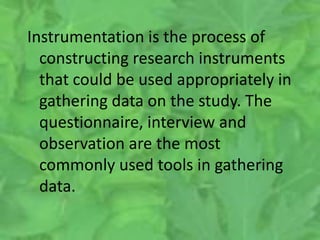Research Instrumentation
- 2. Instrumentation is the process of constructing research instruments that could be used appropriately in gathering data on the study. The questionnaire, interview and observation are the most commonly used tools in gathering data.
- 3. 1. The Questionnaire The Questionnaire is a set orderly arranged questions carefully prepared to answer the specific problems of the study. Webster Dictionary defines the word “questionnaire” as a list of questions to be answered by a group of people especially designed to get facts or information. It is a list of written questions related to a particular topic, provided with space for residents to fill-up (Good, 1959).
- 5. There are two types of questions that could be used in the preparation of a questionnaire, namely: 1) Open-ended question. The questions are listed in a way that it allows the respondents to freely express himself or herself on the subject or issue. It does not enumerate alternative responses. Example: “How are you affected by the change of leadership in your organization ?” “What do you suggest to improve the management of your organization?” Open-Ended Question
- 6. 2) Fixed Alternative Question. This is otherwise called the closed type of question which provides a list of choices among enumerated alternatives. Hence, the subject responses are limited to a specific alternative. Example 1: “what is the status of the local programs and projects initiated by municipal/city government units towards attainment of MDG 5 or improved maternal health? 5 Very Much Initiated 4 Much Initiated 3 Moderately Initiated 2 Slightly Initiated 1 Not at all
- 7. a) Performance measures and managing for results b) Combating corruption and promoting new work culture c) Encouraging partnership, cooperation, and collaboration for good governance d) Establish feedback mechanisms e) Providing policy and institutional support f) Improving and strengthening public confidence in government system and justice g) Disclosure of public information h) Using information technology and clear and simplified online transactions. Example 2. The items below are solutions adopted to the problems encountered by the government officials that affect their governance. Rank each item from 1 to 8; 1 as the most effective solution and 8 as the least solution.
- 8. The tabulation of the results of a dry-run should be done to find-out as to whether the answers being tabulated provide significant solutions to the specific questions of the study. This may also provide an idea of how to improve the questionnaire and to make the tabulation of results easy and enable the researchers to tabulate the responses accurately.
- 9. The questionnaire should include clear instructions or directions of what to do with the list. Each questionnaire should include a cover letter cordially and courteously composed, neatly organized and typed, containing the following information: 1.Introductory greetings, the subject of the study, and a brief description of significance of the study; 2. Vital role of the respondent in answering the questions;
- 10. b) Preparation of the Questionnaire •A review of related literature and studies will be very helpful in the preparation of the questionnaire. Once a topic for research has been decided and approved by the appropriate body, the formulation of specific questions follows. Try to examine the questionnaires used in some of the research studies similar to your approved topic. •They can serve as a guide in the formulation of your questions in the questionnaire. You may also talk to people who are knowledgeable in the construction of a questionnaire. •Draft your questions and after its completion, finalize the questionnaire for comments and suggestions for improvement to your adviser or to anyone who is knowledgeable on the preparation of a questionnaire for editing.
- 11. •Find time to rewrite the questionnaire taking into consideration and integrating the corrections and suggestions given. •Test for the reliability, effectiveness and validity of your questionnaire through dry-run. Take into consideration the clarity of items, vagueness of statements, time element in answering the questions, convenience in tabulating the answers, difficulties and other related problems. •A dry-run is done to a group of people composed of at least 20 members of the same characteristics as the respondents of your study. If for example your respondents are Local Government Executive (LGEs) of a city or district, your questionnaire can be administered for dry-run to some 20-30 LGEs of another city or district.
- 12. •Where to return the questionnaire and when (deadline). To facilitate return of completed questionnaire, a self- addressed stamped envelope may be included for out-of- town respondents; •Guarantee of confidentiality of the information and anonymity of The respondents. •Statement of gratitude for the cooperation and participation of the respondents. •Expression of willingness to supply the respondents the result of the study. •Personal signature of the researcher, and •Endorsement from respected and influential person/s related to the study. This may help in the excellent retrieval of the questionnaire.
- 13. Republic of the Philippines Pangasinan State University GRADUATE SCHOOL Urdaneta City September 8, 2014 ____________________________ ____________________________ ____________________________ Sir/Madam: The undersigned is a graduate school student of Pangasinan State University, Urdaneta City, presently working on a research entitled “Development Orientation and Governance of Municipal and City Government Officials in Pangasinan”. In view of this, may I would like to request permission from your good office to administer and float questionnaires to city/municipality appointive government officials so that the objectives of the study may be fully realized. Thank you for your favorable response to this request. More power and God bless. Very truly yours, NOIME F. SALON Researcher Noted: ZENAIDA U. SUYAT, ED. D. Dean













